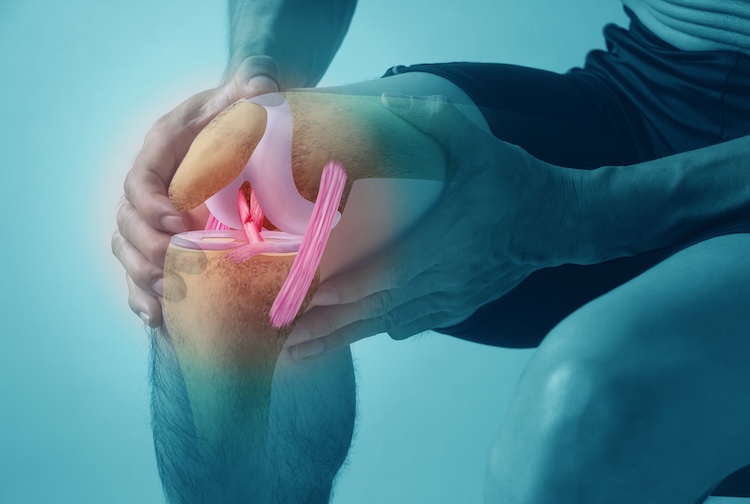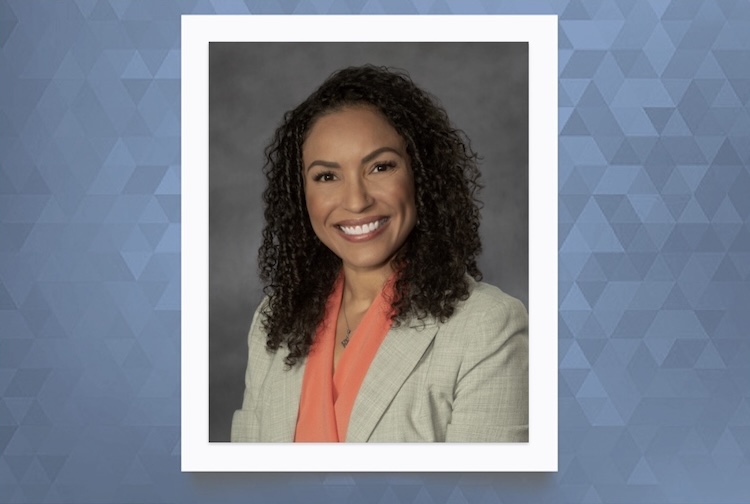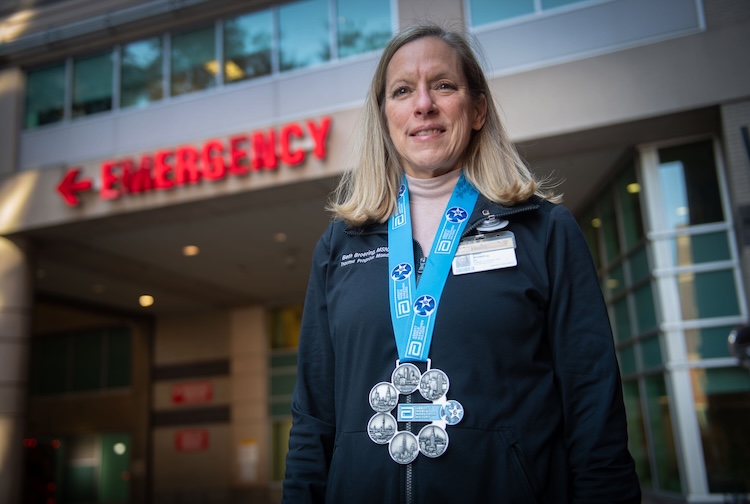‘If you don’t have food, your body can’t heal’
The Food is Medicine initiative at VCU Massey Comprehensive Cancer Center is reducing cancer's burden by helping cancer patients focus on health, not hunger.
August 13, 2025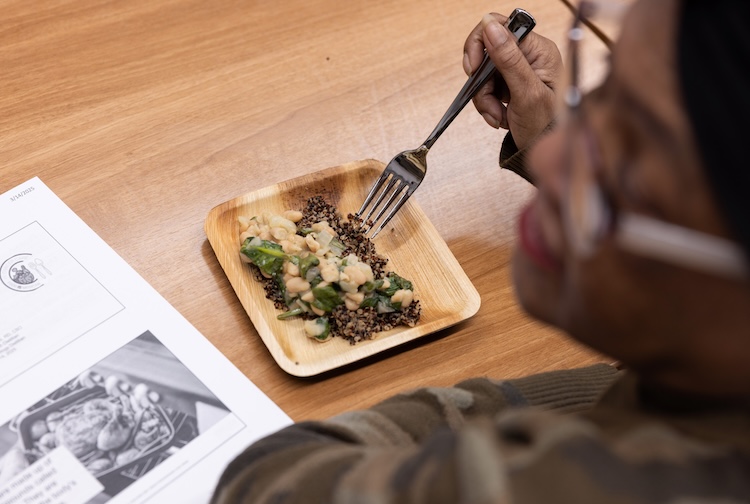 With help from the McKesson Foundation, VCU Massey Comprehensive Cancer Center is tackling food insecurity through access and education. (Daniel Sangjib Min, MCV Foundation)
With help from the McKesson Foundation, VCU Massey Comprehensive Cancer Center is tackling food insecurity through access and education. (Daniel Sangjib Min, MCV Foundation)
By Holly Prestidge
Cancer is heavy. Melissa Earley’s wit keeps things light.
The tumor that was removed from her breast in 2023 was roughly the size of a baseball. She named it Wilson, referencing the moniker given to a volleyball by Tom Hanks’s character in the iconic movie “Castaway.”
Melissa joked that she opted for double mastectomy because being “lopsided” would cause her to walk in circles.
Her life is so very different now.
“The day that I got my diagnosis, my life changed forever,” she said softly. “My head was spinning.”
Melissa’s treatments, which will continue for several years, sometimes wipe her out for days at a time or land her in the hospital.
So, she had to stop working. The financial hit has further strained her already fatigued mind and body and exposed her to the grim realities of life for many cancer survivors. What money she had was, by necessity, allocated to other bills. Food — among the most basic of necessities — became a daily concern.
“The ability to fill our fridge got harder and harder, and then it got to where we wouldn’t have food in the house,” Melissa said.
(Tyler Trumbo, MCV Foundation)
Over the last year and a half, she and her partner, Nona, have struggled to eat. She has accepted meals from her church and other friends. Kind souls give them grocery store gift cards. Melissa sheepishly admits she would sign up for public events if there was food involved, just so she could eat and maybe take leftovers home.
As someone who worked as a paramedic and a nurse, Melissa said she was used to being the one to offer aid and solve problems.
“But I couldn’t figure this out,” she said.
Melissa isn’t alone.
Thirteen percent of people in the United States do not have enough to eat or know where their next meal will come from, according to the U.S. Department of Agriculture. People who have cancer are more impacted by food insecurity compared to the national average, with numbers ranging from 17% to as high as 55% of the patient population.
About 40% of cancer patients surveyed by VCU Massey Comprehensive Cancer Center in 2023 reported some level of food insecurity, which was jarring to Susan Hong, M.D., the director of Massey’s Cancer Survivorship Program.
“There’s a lot of financial toxicity associated with cancer,” Hong said. “Cancer has a massive impact on people’s lives and their ability to work. If you can’t eat or access food, that’s going to have a ripple effect. Poor nutrition affects your ability to tolerate treatments and that adds a huge layer of stress to your life.”
How the ‘Food is Medicine’ program is reducing cancer's burden
Under Hong’s leadership, the comprehensive cancer center established a plan called Reducing Cancer’s Burden, from which came the initiative shepherded by the MCV Foundation and funded by the McKesson Foundation called In Cancer Care, Food is Medicine.
Food is Medicine has a three-pronged approach that includes providing patients with emergency food boxes from Feed More plus connections to additional resources within the community; cooking and nutrition classes for patients and their caregivers; and permanent spaces within the VCU Health Adult Outpatient Pavilion where patients can access non-perishable as well as fresh seasonal food.
Thus far, Hong says, Food is Medicine has been exceedingly effective.
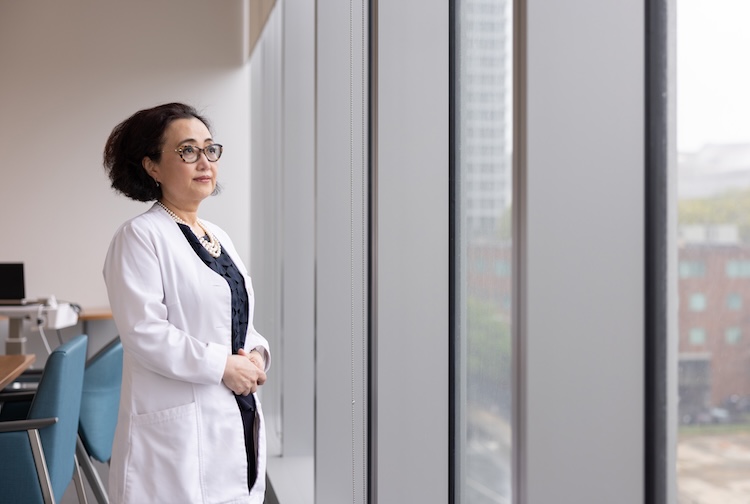
Susan Hong, M.D., director of VCU Massey Comprehensive Cancer’s Cancer Survivorship Program. (Daniel Sangjib Min, MCV Foundation)
In its first year, Massey is already surpassing some of its goals. More than 300 boxes of emergency food have been distributed — four months earlier than expected.
Monthly and quarterly nutrition classes are registered to capacity, and participants routinely receive basic kitchen equipment and fresh food along with cooking demonstrations, easy-to-follow recipes and produce vouchers.
“Being in an environment where you’re not alone, where there are resources we can provide to you, makes a big difference,” Hong said. “We’re making sure we close the loop.”
Finding a place to heal
During a treatment session last year, Melissa was introduced to Food is Medicine when she was handed an emergency box of food.
“It was like magic,” she remembers thinking. “It was so heavy and when I opened it, there was enough food in there for like a week, maybe two.”
She also received vouchers to purchase fresh produce from Shalom Farms.
“They gave me what looked like Monopoly money; but it was real, it was spendable,” she said excitedly. “And that money would buy a lot, and they told me I could get more the next time.
“I just cried,” she added.
The outreach underscores why she chose VCU Health and Massey for treatment.
“I knew I wanted my treatment at Massey,” she said. “Hands-down this is where I wanted to be.”
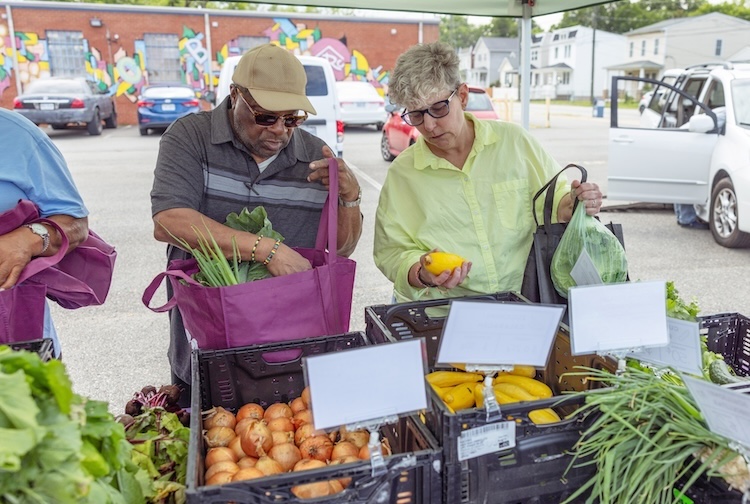
Melissa Earley, a patient at VCU Massey Comprehensive Cancer (right), talks with a fellow shopper at the Shalom Farms stand in Richmond’s Fulton Hill neighborhood. (Daniel Sangjib Min, MCV Foundation)
Superior medical treatment is only part of the reason for that gratitude.
“Here, I’m not just a patient; I’m Melissa, and I have relationships with people. People know what’s going on in my world when I come here,” she said. “You don’t find that everywhere, but that’s a big deal.”
Melissa says Massey understands that healing the whole person is crucial.
“Cancer is a beast, and if you have it, you need everything possible to fight it,” she said. “My body doesn’t crave chemo. My body doesn’t crave the pills I take. But my body craves food, and none of that other stuff matters if I don’t have something to eat.”
Despite what she’s been through, Melissa is grateful — for her family, including her beloved fur babies Tobias Theodore Henry and Sebastian River Hunter; for her medical team and everyone she’s met through treatment at Massey and VCU Health; and for the support from organizations like the McKesson Foundation that allow her to focus on health and not hunger.
“I didn’t choose to be a cancer patient, but I chose to be a Massey patient,” she said. “This is not just a place to come for medical treatment, it’s a place to heal.”
If you are interested in supporting the Food is Medicine initiative, please contact Carissa Liverpool at 804-828-1450 or liverpoolc@vcu.edu.
The original version of this story was published by the MCV Foundation.


